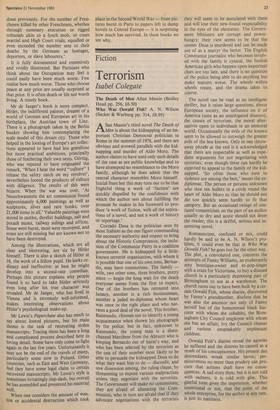Fiction
Terrorism
Isabel Co legate
The Death of Men Allan Massie (Bodley Head pp. 256, £6.50) Who Was Oswald Fish? A. N. Wilson (Secker & Warburg pp. 314, £6.95) AIlan Massie's third novel The Death of Men is about the kidnapping of an important Christian Democrat politician in Rome in the summer of 1978, and there are obvious and avowed parallels with the kidnapping and murder of Aldo Moro. The author claims to have used only such details of the case as are public knowledge and to have attempted no resemblance to the Moro family, although he does admit that the central character resembles Moro himself. Initial fears lest this may turn out to be that frightful thing a work of 'faction' are quickly dispelled by the confidence with which the author sets about fulfilling the promise he makes in his foreword to produce 'a work of fiction, with all the aspirations of a novel, and not a work of history or reportage.'
Corrado Dusa is the politician seen by most Italians as the one figure commanding the necessary authority and respect to bring about the Historic Compromise, the inclusion of the Communist Party in a coalition government. He is kidnapped by a littleknown terrorist organisation, with whom it is possible that one of his own sons, Bernardo, may have connections. The family — wife, two other sons, three brothers, pretty niece — begin the long wait for the death everyone seems from the first to expect. One of the brothers has retreated into lunacy, another is a rich businessman, another a jaded ex-diplomat whose heart was once in the right place and who narrates a good deal of the novel. This brother, Raimundo, chooses not to identify a young acquaintance when shown his photograph by the police; but in fact, unknown to Raimundo, the young man is a disenchanted Marchese from the Abruzzi who is keeping Bernardo out of harm's way, and who has been selected by the terrorists as the one of their number most likely to be able to persuade the kidnapped Dusa to do what they want him to do — discredit, and sow dissension among, the ruling clique, by threatening to expose various malpractices unless they negotiate with the terrorists. The Government will make no concessions; they are afraid of alienating the Communists, who in turn are afraid that if they advocate negotiations with the terrorists they will seem to be associated with them and will lose their new-found respectability in the eyes of the electorate. The Government Ministers are corrupt and powerhungry; their view seems to be that the sooner Dusa is murdered and can be made use of as a martyr the better. The English Communist journalist who becomes involved with the family is cynical, the foolish American girls who happen upon important clues are too late, and there is no question of the police being able to do anything but make matters worse. The wheels within wheels rotate, and the drama takes its course.
The novel can be read as an intelligent thriller, but it raises large questions, about European society, the influence on it of America (seen as an unmitigated disaster), the causes of terrorism, the moral alternatives open to individuals in an immoral world. Occasionally the evils of the known seem to be allowed to outweigh the greater evils of the less known. Only in one throwaway phraSe at the end is it acknowledged that there are respectable as well as expedient arguments for not negotiating with terrorists, even though these can hardly be expected to appeal to the family of the kidnapped. `So often those who turn to violence are among the best,' muses the exdiplomat. The person or persons unknown who shot ten bullets in a circle round the heart of Aldo Moro so that he should not die too quickly seem hardly to fit that category. But an occasional twinge of confused romanticism on the part of an author usually so dry and acute should not deter the reader; this is a skilful, serious and interesting novel.
Romanticism, confused or not, could hardly be said to be A. N. Wilson's problem; it could even be that in Who Was Oswald Fish? he goes too far the other way. The plot, a convoluted one, concerns the attempts of Fanny Williams, an exuberantly sexy boutique-owner and ex-pop-singer with a craze for Victoriana, to buy a disused church in a particularly depressing part of Birmingham to use as a warehouse. The church turns out to have been built by a certain Oswald Fish, whose diaries, discovered by Fanny's grandmother, disclose that he was also the ancestor not only of Fanny herself but of the homosexual black barrister with whom she cohabits, the Birmingham City Council employee with whom she has an affair, Ivy the Council cleaner and various unspeakably unpleasant children.
Oswald Fish's diaries reveal the agonies he suffered and the distress he caused as a result of his concupiscence. His present day descendants wreak similar havoc; permissiveness no more than prudery can procure that actions shall have no consequences. A sad story then; but it is not told with sadness, it is told with glee. This gleeful tone gives the impression, whether intentional or not, that the point of the whole enterprise, for the author at any rate, is just its nastiness.










































 Previous page
Previous page